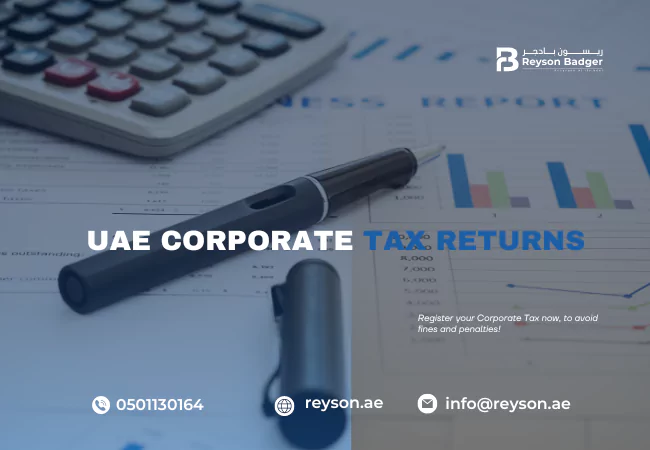
UAE Corporate Tax Return filing is a mandatory obligation for companies operating in the UAE, and failure to comply with this requirement can lead to penalties and fines. With the announcement of the UAE corporate tax law, companies are gearing up to submit their corporate tax returns within the specified timeframe set by the Federal Tax Authority (FTA). The Corporate Tax Return Filing in UAE is filed by the Taxable Person for a specific tax period on the information about Corporate tax liability and payment. The Tax Return should be filed within a specific period with the tax authority according to the Corporate Tax Law.

The inception of Corporate Tax occurred in January 2022 under the auspices of the Ministry of Finance, UAE, paving the way for implementation either by June 2023 or by January 2024. The Corporate Tax Law is scheduled to take effect on June 1, 2023, featuring a headline rate of 9%. Profits below AED 375,000 annually are taxed at a 0% rate. The legislative framework incorporates elements aligned with international best practices in taxation.
Every taxable entity is required to register for Corporate Tax and obtain a Tax Registration Number. Additionally, in certain scenarios, the tax authority may mandate exempt entities to register for Corporate Tax as well.
Corporate tax return filing in the United Arab Emirates (UAE) involves submitting a comprehensive report to the appropriate tax authority, outlining a company's income and expenses. The UAE Corporate Tax Return Filing is filed by the Taxable Person for a designated tax period, providing details regarding corporate tax liability and payments. It is imperative to file the Tax Return within the specified timeframe as stipulated by the Corporate Tax Law.
The United Arab Emirates (UAE) has implemented a federal corporate tax regime effective for financial years starting on or after June 1, 2023. The standard corporate tax rate is 9% on taxable income exceeding AED 375,000 Income below this threshold is not subject to corporate tax, effectively allowing small businesses and startups to operate without tax burdens on their initial earnings.
In the UAE, Corporate Tax is governed by Federal Decree-Law No. 47 of 2022 on the Taxation of Corporations and Businesses. Corporate Tax returns must be filed by individuals and entities that meet the following criteria:
Certain categories, such as government entities, qualifying public benefit entities, pension funds, and investment funds, may be exempt from corporate tax. However, they still need to meet specific conditions and may need to notify the Federal Tax Authority (FTA) and file returns to maintain their exemption status
Yes, if you have a company in the United Arab Emirates (UAE), you have to do something called filing Corporate Tax returns. This means you have to give some information about your company's money to the government. Even if your company didn't make any money, you still have to do this. But if your company made less than AED 375,000, you don't have to pay any tax. It's important to follow these rules because if you don't, you might have to pay fines.
Yes, they do. Even if they're in a Free Zone, they still have to file Corporate Tax returns. It doesn't matter if they qualify for certain benefits or not; they still have to do it.
They only have to do it once for each tax period. After the tax period ends, they get nine months to file their Corporate Tax return. They don't need to do any preliminary filings or pay anything in advance.
When you're doing Corporate Tax Return filing, you need to give details about how much money your company made and spent. Then, after calculating everything, you figure out how much tax your company owes the government.
Here are some important documents you'll need:
At Reyson Badger, tax experts and professionals make sure all this information is correct and help you get the most out of your tax claims while keeping you safe from audits.
Businesses in the UAE are granted a timeframe of up to 9 months from the conclusion of the relevant tax period to submit their tax return and settle the Corporate Tax dues with the Federal Tax Authority (FTA). For instance, a company whose first tax period commences on June 1, 2023, will have until February 28, 2025, to meet this deadline. Similarly, a company with a first tax period beginning on January 1, 2024, would be required to file by September 30, 2025.
This initiative underscores the UAE's commitment to ensuring the seamless implementation of Corporate Tax policy. The advantages of timely corporate tax return filing include efficient cost management, effective time management, consolidation of group tax filings into a single return, and the opportunity to offset tax liabilities among group entities, with some entities generating taxable profits while others may incur tax losses.
We are well-equipped to assist you in calculating your tax liability for Corporate Tax and guide you through the entire Corporate Tax return filing process in the UAE, ensuring compliance with regulatory requirements and facilitating a smooth experience.
The UAE imposes penalties for companies that fail to comply with Corporate Tax return filing deadlines. Here's a breakdown of the key fines:
Corporate tax consultants play a vital role in assisting businesses with tax compliance, ensuring accurate and timely preparation and filing of tax returns. These experts navigate complex tax laws and regulations, identifying opportunities for tax savings and minimizing potential liabilities. By outsourcing corporate tax compliance, companies can benefit from increased efficiency, reduced risk, and cost savings. As Reyson Badger notes, "Partnering with a reputable corporate tax consultant can provide businesses with peace of mind, knowing their tax obligations are being managed by experienced professionals.
Reyson Badger Auditing Services gives you highly knowledgeable and experienced tax consultants in the UAE, dedicated to providing clients with top-tier Corporate Tax services. Our expertise ensures that clients remain compliant with the laws and regulations set forth by the Tax Authority.A company's UAE Corporate Tax Returns are an important element of compliance for companies operating in the region.
Our comprehensive services encompass guiding clients through document preparation, calculating tax liabilities, and ensuring compliance with Corporate Tax activities such as registration, filing returns, and managing refunds, among others.
Require assistance with filing Corporate Returns? Contact us today!!! We're here to help!